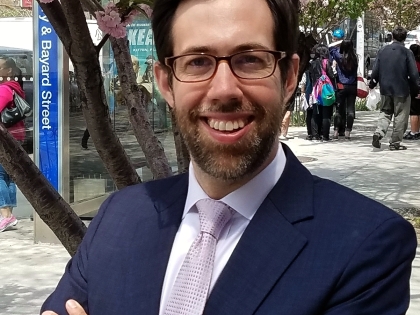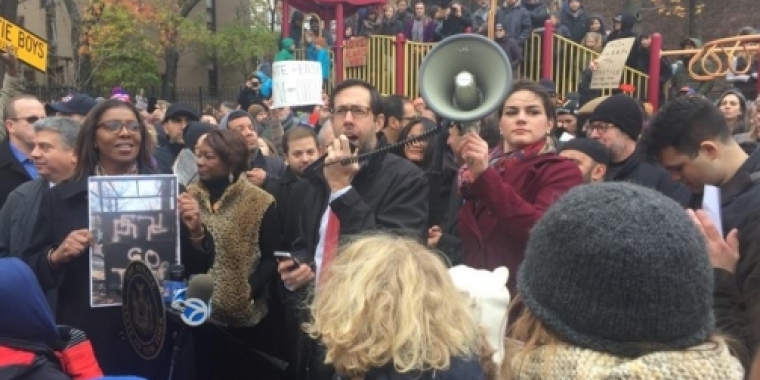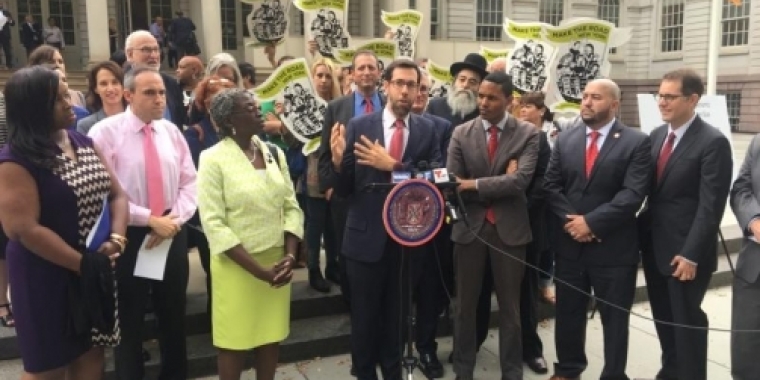
CNN: Evacuation time running out in mid-Atlantic states, New England
(CNN) -- Officials in the mid-Atlantic states and southern New England on Saturday sounded fresh warnings about Hurricane Irene and told residents they were nearly out of time to leave for safer ground.
"Even if you have to walk, evacuate now," said New York Mayor Michael Bloomberg.
The city was under a tornado watch late Saturday. A tornado watch indicates that conditions are favorable for a tornado to form. No tornado has developed or been reported yet.
Philadelphia Mayor Michael A. Nutter declared a state of emergency, the first such declaration since 1986.
Ocean City, Maryland, Mayor Rick Meehan said Saturday evening that he was pulling police off the streets because of deteriorating conditions. Emergency calls will be handled on a case-by-case basis, Meehan told CNN.
Forecasters have told the mayor that waves could soar as high as 15 feet, especially when the worst of the storm hits the city between midnight and 3 a.m. Sunday.
Hurricane hunter warns Northeast NJ Gov.: Irene 'ominous for our state' Seniors choose hurricane party over cots Homeland Security warns about Irene
"Do not venture outside," Meehan said. "This is not a hurricane party. This is a very serious storm."
New York started closing its mass transit system at noon on Saturday, following a mandatory evacuation order for more than 370,000 residents of low-lying areas in the city. Many are streaming out, but others are staying put.
Those who had planned to stay but changed their minds had few, if any, options by Saturday evening. Entrances to subway stations were padlocked or roped off.
A decision to cut electric service will be made between 2 and 10 a.m. Sunday, if needed, said Con Edison Senior Vice President John Miksad. The two networks that will most likely be cut span from the Brooklyn Bridge to Battery (the tip of Manhattan) along the East River and extend to west to Broadway. These are called the Fulton and Bowling Green networks. Nearly 18,000 people would be affected if those networks are cut.
There will be no incoming or outgoing flights Sunday out of the five New York-area airports -- John F. Kennedy, LaGuardia, Newark Liberty, Teterboro and Stewart -- operated by the Port Authority of New York & New Jersey, agency spokesman Steve Coleman said Saturday afternoon.
The storm, a Category 1 hurricane with top sustained winds of 80 miles per hour, headed into Virginia, taking aim for the Norfolk area. It will pound the Delmarva Peninsula overnight and hit the New Jersey coast early Sunday, with Philadelphia and New York City in its sights.
Bloomberg, just a few hours before the Metropolitan Transportation Authority shut down, exhorted residents to leave immediately. Its buses, subways and railroads carry about 5 million riders daily. And it might not be fully back up by Monday, he said.
"Let's stop thinking this is something that we can play with. Staying behind is dangerous, staying behind is foolish, and it's against the law. And we urge everybody in the evacuation zone not to wait until there are gale-force winds and driving rain to leave," Bloomberg said.
Bloomberg said 91 evacuation and emergency shelters have been set up for about 70,000 people.
City employees worked against the clock and storm conditions Saturday evening to evacuate by bus public-housing residents along the East River in the Lower East Side.
Chris Gilbride, a spokesman for the Office of Emergency Management, said, "The mandatory evacuation time is 5 p.m., but we won't stop evacuating until 9 or 10, whenever we reach the sustained winds of 40 mph. There comes a time when it's too late to travel."
State Sen. Daniel Squadron said that while the "city has been aggressive and responsive last night and today," he was concerned that several thousand of the residents may have to ride the storm out. The ordered shutdown of elevators in the buildings, which are up to 10 to 13 floors tall, was making the evacuation more difficult.
New York police were sending vehicles through the low-lying areas on Saturday afternoon and evening to broadcast the message that residents must evacuate.
The city is expecting a tidal surge to come in with the storm, Bloomberg said. "It would flood an awful lot, it would do a lot of damage to mechanical equipment."
Buildings were turning off elevators because they don't want people stuck in them later.
The Staten Island Ferry was operating Saturday afternoon, but there wasn't a large demand.
Beaches and cultural institutions were closed for the weekend. Construction has been stopped in the city.
Bloomberg urged high-rise residents to stay away from windows if they live on the 10th floor or above. And he urged people not to have a generator inside their home or apartment because "carbon monoxide fumes kill."
Kristiina Eelnurme, a 26-year-old Brooklyn resident who doesn't plan to evacuate because she's not in a low-lying area, noted that people "were not taking the potential threat of a hurricane seriously" until Friday.
"I'm worried mostly about the danger of debris, flooding and for the safety of the city's homeless through this," she said.
The Maryland Transit Administration said it was halting all subway and bus services at 9 p.m. Saturday -- with light rail transport ending three hours earlier. The Chesapeake Bay Bridge (U.S. 50/301) was closed Saturday until winds ease, according to the Maryland Transportation Authority.
States moved in additional National Guard troops to help with the response. Illinois Gov. Pat Quinn sent guardsmen and emergency management personnel to assist 1,900 New York Guard members on active duty.
In Newark, New Jersey, Mayor Cory Booker went door-to-door Saturday, telling residents to exhibit safe behavior at home and on the road. "I benefited a lot from the surprise factor" when people opened the door, he told CNN. "I think they got the point."
Philadelphia's mass transit system will be closed at 12:30 a.m. on Sunday. The international airport was to close late Saturday.
While the city isn't issuing an evacuation order, it is urging people to proceed to a shelter or a safe location if there is danger.
"This is a dangerous storm, and I want to urge our residents to exercise extreme caution," Nutter said. "Residents and businesses in low-lying areas should prepare immediately."
Liam O'Keefe, deputy managing director for emergency management, is urging residents to check up on loved ones and neighbors, particularly the elderly and people with special needs.
New Jersey communities have issued mandatory evacuations, opened shelters, and closed roads. Atlantic City casinos are shut and beaches are empty.
"We started evacuations early, to get people out and most of the people heeded the evacuations," said State Police Lt. Nicholas Massa.
"Once it starts getting tropical-force winds, it's going to be very hard and vehicles are going to be told to move off the road, and if you didn't leave you're going to have to hunker down. The power goes out, you're not going to be able to call for help, you're going to have to stay there until we get there," he said.
Emergency authorities said they expected Irene to rumble up the coast Saturday night as the storm made a beeline for Norfolk-area cities and Richmond in Virginia. Tornado warnings were issued in the state as the storm neared Saturday.
Delaware's transportation department said it planned to close bridges when sustained winds reach 45 miles per hour.
Even before the storm struck, Maryland emergency officials asked people to take steps that would not impede recovery efforts. They asked people who want to volunteer not to travel to a disaster scene "before the needs of survivors are determined."
The city of Baltimore urged citizens in low-lying areas to relocate vehicles to higher ground.
Gov. John Lynch said New Hampshire was in a state of emergency and urged residents to heed emergency officials' warnings to stay away off roads, beaches and waterways on Sunday.
The Massachusetts Bay Transportation Authority in Boston, meanwhile, announced the suspension of Sunday services.



